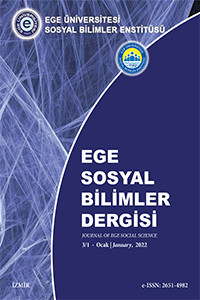Abstract
Tarih boyunca dünya doğayı hakimiyeti altına almaya çalışan insan merkezli düşünce ile pek çok yıkıma ve insanların kötü davranışlarına maruz kalmıştır. Bu yaklaşım, hayatın her bölümünü etkileyen doğal kaynakların yaygın bir şekilde kötü kullanımı yönüyle dünya için büyük tehdit yaratmaktadır. Orman tahribatı, nükleer tehdit ve hayvanlara işkence modern dünyanın başlıca problemleri arasında yer alır ve dünya ananın döngüsü ekolojik felaketlere neden olmaya başlamaktadır. Bütün bunlar göz önüne alındığında, çevresel konuları merkez alan yeni teorileri analiz eden yaklaşım ortaya çıkar ve buna Ecocriticism* (Çevresel-Eleştiri) denir. İnsan merkezli bakış açısının aksine edebi eserlerdeki çevresel durumlar ile ilgilenen çok bilinen bir akımdır. Bu çalışma, Lydia Millet’in yazdığı öykü olan “Zoogoing” adlı eserin nasıl hayvan haklarına özellikle yırtıcılara karşı çevresel bakış açısı getirdiğini gösterir. Çalışma, öyküyü insan merkezli ve çevresel bakış açısı ile eleştirmektedir. İnsan ve hayvan davranışlarına karşı oluşan çevresel bilinç sürecini anlamamızı sağlayan öykü, hayvanat bahçesindeki hayvanlara ve insanlığa karşı yorumcu çevresel kritik oluşturmaktadır. Bu noktada, insan davranışları ve onların hayvanlara karşı olan algılarını Çevresel Eleştiri noktasında inşa etmeye çalışır.
Thanks
Bu çalışma Ege Üniversitesi 1. Uluslararası Ege Sosyal Bilimler Lisansüstü Öğrenci Kongresi'nde sunulmuştur. Emeği geçen herkese çok teşekkürler.
References
- Aykanat, F. (2018). “Antroposen Çağı'nda Hayvanat Bahçeleri: Lydia Millet'in Hayvanat Bahçesine Gidiş [Zoogoing] Öyküsünde Ekolojik ve Duygusal İnsan-Hayvan Etkileşimleri.” Şarkî Edebiyat ve Sanat Dergisi: Hayvan Çalışmaları Özel Sayısı. Adıyaman: Seçil Ofset.
- Book Browse, “Lydia Millet Biography.” BookBrowse LLC. 1997-2021. Retrieved from https://www.bookbrowse.com/biographies/index.cfm/author_number/2242/lydi a-millet
- Carson,R. (1962). Silent Spring. Greenwich: A Crest Book.
- Derrida, J., Marie-Louise M., and David W. (2008) The Animal That Therefore I Am. Print. Heise, U. K. (2008) Sense of Place and Sense of Planet: The Environmental Imagination of the Global. NY: Oxford University Press.
- Leopold, A. (1949). A Sand County Almanac and Sketches Here and There. NY: Oxford University Press.
- Millet, L. (2011). “Zoogoing.” (Ed.) Mark Martin. I’m With the Bears: Short Stories from a Damaged Planet. The U.S.A: Verso.
- Mishra, S. K. (2016). “Ecocriticism: A Study of Environmental Issues in Literature.” BRICS Journal of Educational Research. 6(4),168-170.
- “Smithsonian Institution Archives.” Roosevelt African Expedition Collects for SI. Retrieved from https://siarchives.si.edu/collections/siris_sic_193
- Trexler, A. (2015). Anthropocene Fictions: The Novel in a Time of Climate Change. The USA: University of Virginia Press.
Abstract
Throughout history the world faces many destructions and misdeeds of humankind with the anthropocentric perspective that tries to dominate nature. This approach poses a great threat to the world in that the extensive misuse of natural sources affects each part of life. The deforestation, nuclear threat and torturing of animals are the essential problems of modern world, and the cycle of the mother earth becomes disordered ecological disaster at the end. As regarding to these issues, there arose new theories of analyzing the environmental subjects as the central point, and it is called as Ecocriticism. Ecocriticism is a well-known movement which deals with ecocritical outlook to the literary texts in the opposition of anthropocentrism. This paper seeks to reveal how the story “Zoogoing” written by Lydia Millet brings ecocritical literacy towards the rights of animals, especially predators. It analyzes the story from the anthropocentric and eco-centric aspects. This story provides to understand the eco-conscious process within animals and human’s reactions. Thus, it is an interpretive ecocritical analysis of animals inside zoo and their instinctual behaviors towards the humankind. At that point, human behaviors and its perception towards animals construct a crucial analysis in Ecocriticism.
References
- Aykanat, F. (2018). “Antroposen Çağı'nda Hayvanat Bahçeleri: Lydia Millet'in Hayvanat Bahçesine Gidiş [Zoogoing] Öyküsünde Ekolojik ve Duygusal İnsan-Hayvan Etkileşimleri.” Şarkî Edebiyat ve Sanat Dergisi: Hayvan Çalışmaları Özel Sayısı. Adıyaman: Seçil Ofset.
- Book Browse, “Lydia Millet Biography.” BookBrowse LLC. 1997-2021. Retrieved from https://www.bookbrowse.com/biographies/index.cfm/author_number/2242/lydi a-millet
- Carson,R. (1962). Silent Spring. Greenwich: A Crest Book.
- Derrida, J., Marie-Louise M., and David W. (2008) The Animal That Therefore I Am. Print. Heise, U. K. (2008) Sense of Place and Sense of Planet: The Environmental Imagination of the Global. NY: Oxford University Press.
- Leopold, A. (1949). A Sand County Almanac and Sketches Here and There. NY: Oxford University Press.
- Millet, L. (2011). “Zoogoing.” (Ed.) Mark Martin. I’m With the Bears: Short Stories from a Damaged Planet. The U.S.A: Verso.
- Mishra, S. K. (2016). “Ecocriticism: A Study of Environmental Issues in Literature.” BRICS Journal of Educational Research. 6(4),168-170.
- “Smithsonian Institution Archives.” Roosevelt African Expedition Collects for SI. Retrieved from https://siarchives.si.edu/collections/siris_sic_193
- Trexler, A. (2015). Anthropocene Fictions: The Novel in a Time of Climate Change. The USA: University of Virginia Press.
Details
| Primary Language | English |
|---|---|
| Journal Section | makaleler |
| Authors | |
| Publication Date | December 31, 2022 |
| Published in Issue | Year 2022 Volume: 3 Issue: 2 |


